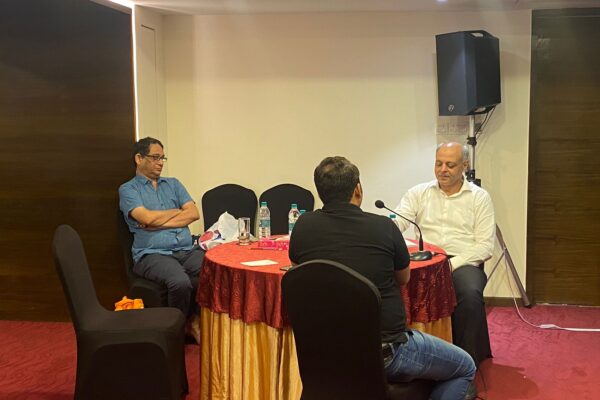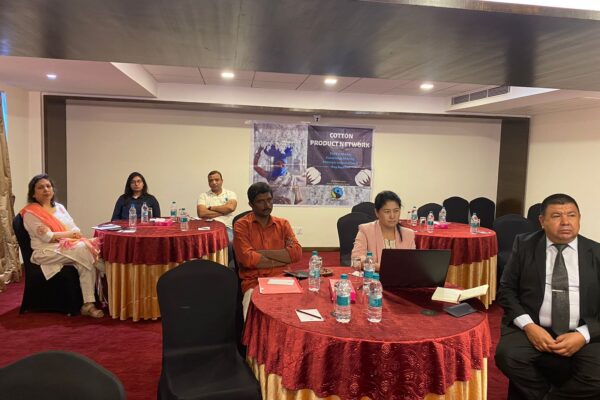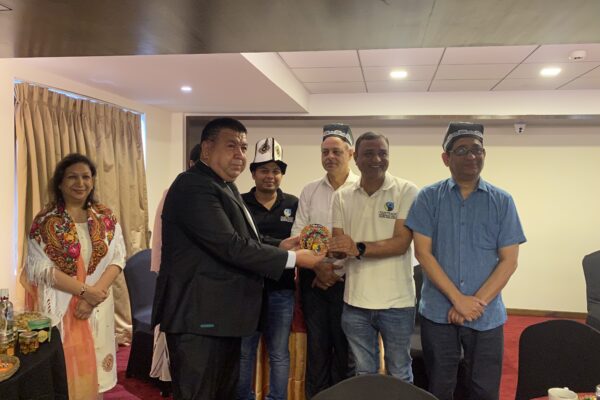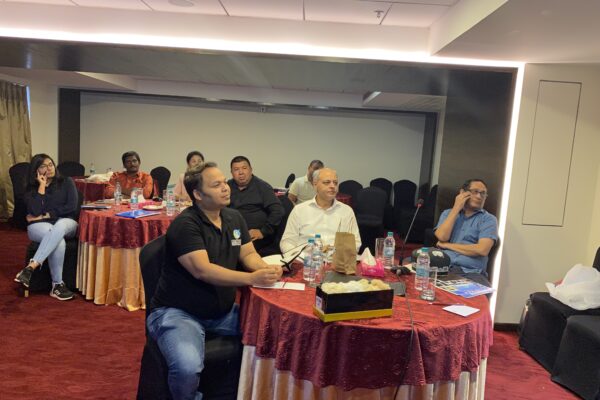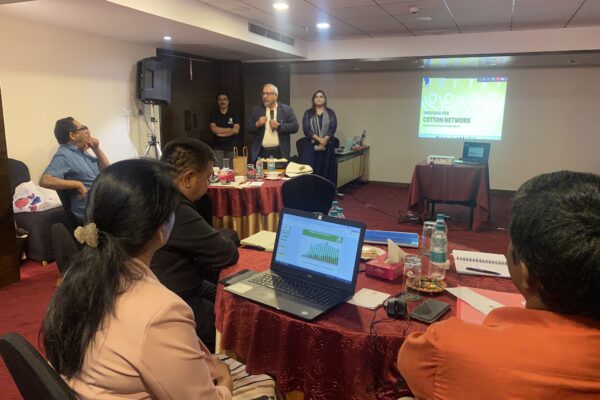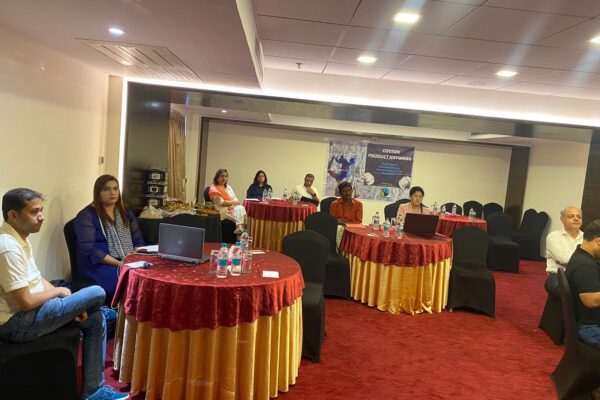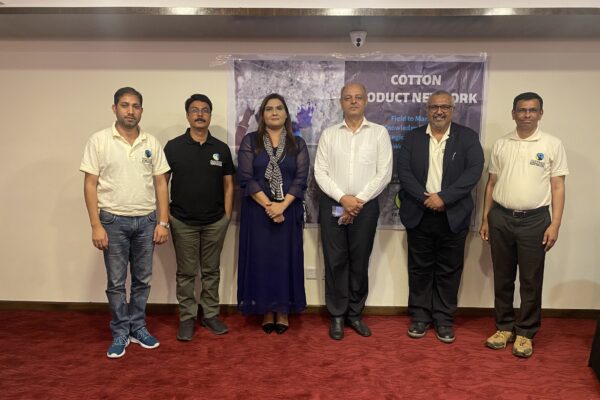
Fairtrade cotton was launched to put the spotlight on farmers who are often left invisible and neglected at the end of a long and complex cotton supply chain. Through Fairtrade more democratic organizations have sought to provide these farmers with an alternative route to trade and higher, more stable incomes. Today cotton is one of the key Fairtrade products being produced and exported majorly from India, Central Asia and Pakistan.
On World Cotton Day a ‘Cotton Network Meeting’ was organised by Fairtrade NAPP with the cotton producer members to identify needs and challenges faced by cotton producers and to make suitable strategies to strengthen them in the Fairtrade supply chain.
The event brought together 11 Cotton Producers from Contract Production and Small Producer Organisations from India, Pakistan and Central Asia to discuss and work together on different challenges they face in production, climate, and market, among others.
The main objectives of the Network Meeting were to:
- To introduce and facilitate networking opportunities for cotton producers of NAPP
- To enable cotton producers to exchange experience, cross-learning, and exposure visits
- To provide a platform to discuss NAPP Interventions – Viz., projects, trade fairs, and programs.
- To frame strategies and solutions for increasing Fairtrade Sales
- To Provide a platform to discuss certification and audit-related issues
- To focus and discuss Key Themes (GAP, Climate Change, Production, etc)
Welcome Address and Key Note Speech
The event started with a welcome address by Sanjeet Singh Khurana- CEO of Fairtrade NAPP who also briefed the participants on the role of Producer Networks in supporting and empowering producers to stay committed to the Fairtrade movement and to sustainably trade in the agricultural markets, etc.
Pravakar Meher- Fairtrade NAPP Board Chair in his key speech mentioned that it was a good occasion for the First Cotton Producers Network being organised on World Cotton Day and supporting weaving a better future for cotton. He discussed the new promising structure of NAPP and platforms to discuss the opportunities, challenges, and solutions that will lay down the road map for the future.
“It was the first time in NAPP that we had such a productive and interactive experience in any meetings/workshops. Good teamwork from the Napp Management team.
Pravakar Meher, Pratima Agro and NAPP-Board Chair

- The Network meeting began with the first session on Farm Level and Supply Chain Production Challenges.
Assad Bajwa from South Asian Sourcing Pvt Ltd, Pakistan, explained about the challenges they are facing in soil preparation, soil testing, seed selection, seed breeding and multiplication, pest control, and the need for alternate pesticides and natural fertilisers. He also highlighted their ongoing work with the Central Cotton Research Institute in Multan, Pakistan, and the latest farm machinery they have developed jointly with CCRI.
Boimamat Uzakov from Non-Commercial Cooperative “Biokishovarz”, Tajikistan expressed that while certification costs are on the higher side, market opportunities were very less for their producers. He discussed the higher cost involved in the multiplication of seeds, the impacts of droughts, and the introduction of drought-resistant varieties by them to mitigate migration.
Arun Chandra Ambatipudi from Chetna Organic, India spoke about their organic Non- GMO, Non -Hybrid breeder seed production in different parts of India with other stakeholders like Vasudha and has expressed their readiness to work with other producers who would be willing to jointly work with them for the multiplication of the seed varieties developed by them.
- Non-GMO Seed Breeding/Production/ Distribution
In the 2nd session, Dr Abdurakhmonov Ilkhomjon Scientific-research institute of cotton selection, seed-breeding and growing agro-technologies, Uzbekistan on modern cotton cultivation practices and the non GMO seed breeding which resulted in higher productivity.
Anjali Mittal from Pratibha-Vasudha Jaivik Krishi Kalyan Samiti, India and Chinnusamy from Anandi Texstyles presented on their Non GMO seed breeding projects.
- Session on Fairtrade Premium Projects and Learning
Several producers exchanged knowledge on their Premium Projects and learnings and best practices. In response to the soil testing challenges raised by Assad Bajwa, Pravakar Meher explained about the Digital Soil Testing Solution they have adopted which is helping in Producer level soil testing at affordable cost on more than 15 parameters.
Discussion of Fairtrade Standards for Small Producer Organisation and Contract Producer
Post lunch the meeting resumed with a briefing on the Fairtrade Standards for SPOs and CP by Fairtrade NAPP Consultants Amit Das and Manoj Kumar. The producers were also requested to participate actively in the upcoming Contract Production Standard Consultation in 2023.
- Marketing Session by National Fairtrade Organisations on the current market trends, challenges and opportunities in the major Fairtrade markets.
The next session was led by Anu Rai; Marcomms Manager- FT-NAPP to provide the producers with an update on the current market statistics. There were virtual presentations from Max Havelar Netherland and France, Fairtrade Poland, Fairtrade Germany, Fairtrade America, Fairtrade Australia and New Zealand.
Subindu Garkhel, Global Product Manager for Cotton from Fairtrade International presented the updates on Fairtrade Cotton and the way forward for strategic collaborations within the Fairtrade Cotton Network team.
- Propose Cotton Network Structure
The meeting was a final presentation from Ranjith Kumar, Regional General Manager, NAPP on the proposed Cotton Network objectives, outcomes, structure, budget, and financing.
Some of the important of the Network Meeting were:
Formation of Committee: The producers agreed that there should be a Committee of three members with designations – Chairperson/Chairman/Deputy Chairman/Vice Chair. 03 names were proposed from India, Central Asia and Pakistan.
Meeting Frequency : Meetings to be held 04 times in a year (03 virtual, 01 physical)
Need Assessment: Consolidated need assessments were received from all the Cotton Producers to be analysed and further submitted by NAPP staff to the committee members. The committee shall review and approve plans for the year.
Learnings and Way forward: Cross Learnings on organic production practices, new technologies adopted as part of Premium Projects, non-GMO seed production.
“The Cotton Network meeting was very helpful in many ways. I learned from all the NFOs about the positive impacts of Fairtrade across various countries. The physical presence of all the cotton growers, the sharing and exchange of knowledge has greatly assisted me in understanding the market and potential future opportunities. It was really beneficial to talk with the NAPP team about the problems we face as cotton producers and how we can fix them. Finally, it was uplifting to hear about all the premium projects that have been implemented in different countries and how it has benefited the farmers and their families. I want to express my gratitude to the entire NAPP team for a successful experience. Om Organic is anticipating more similar occasions so that it can develop and learn alongside the NAPP team and other cotton growers.
Monika Bansal, Om Organic Cotton Pvt Ltd


